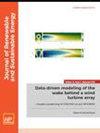基于毕达哥拉斯模糊 ELECTRE-III 方法的海上光伏电站选址决策框架
IF 1.9
4区 工程技术
Q4 ENERGY & FUELS
引用次数: 0
摘要
海上光伏发电站(OPVPS)可极大地帮助解决能源问题和土地资源稀缺问题。OPVPS 项目生命周期的一个关键阶段是选址。针对环境的不确定性、标准间的补偿关系、备选方案的不同属性等诸多困难,本文提出了基于毕达哥拉斯模糊消除与现实选择-Ⅲ(ELECTRE-Ⅲ)方法的模糊多标准决策框架,为 OPVPS 的最优选址提供了参考。首先,构建了 OPVPS 选址的综合标准体系,其中包括否决标准和评价标准。其次,使用毕达哥拉斯模糊集来表达专家的不确定评价。第三,考虑到专家的经验和能力各不相同的实际情况,本文提出了一种新颖的专家加权法。第四,引入了熵权法、最佳-最差法和博弈论的组合权法来计算标准权重。第五,考虑到标准之间的补偿,采用 ELECTRE-III 进行排序。最后,为了验证所提框架的适用性和稳健性,进行了一项中国案例研究,结果表明海州湾是最佳备选方案。本文章由计算机程序翻译,如有差异,请以英文原文为准。
A decision framework of offshore photovoltaic power station site selection based on Pythagorean fuzzy ELECTRE-III method
Offshore photovoltaic power stations (OPVPS) greatly help solve energy problems and land resource scarcity. A crucial phase of the OPVPS project lifecycle is site selection. To select the optimal location of OPVPS with many difficulties such as the uncertainty of the environment, the compensating relationships among criteria, and the different attributes of the alternatives, this paper proposed a fuzzy multi-criteria decision-making framework based on Pythagorean fuzzy Elimination et Choix Traduisant la Realité-III (ELECTRE-III) method. First, the comprehensive criteria system for siting OPVPS was constructed, which included veto and evaluation criteria. Second, the Pythagorean fuzzy set was used to express the uncertain evaluation of experts. Third, considering the actual situation that experts had different experiences and abilities, this paper proposed a novel expert weighting method. Fourth, entropy weighting method, best–worst method, and combination weighting of game theory were introduced to calculate the criteria weights. Fifth, considering the compensation between criteria, ELECTRE-III was used for ranking. Finally, to verify the applicability and robustness of the proposed framework, a China case study was conducted; the results showed that Haizhou Bay is the best alternative.
求助全文
通过发布文献求助,成功后即可免费获取论文全文。
去求助
来源期刊

Journal of Renewable and Sustainable Energy
ENERGY & FUELS-ENERGY & FUELS
CiteScore
4.30
自引率
12.00%
发文量
122
审稿时长
4.2 months
期刊介绍:
The Journal of Renewable and Sustainable Energy (JRSE) is an interdisciplinary, peer-reviewed journal covering all areas of renewable and sustainable energy relevant to the physical science and engineering communities. The interdisciplinary approach of the publication ensures that the editors draw from researchers worldwide in a diverse range of fields.
Topics covered include:
Renewable energy economics and policy
Renewable energy resource assessment
Solar energy: photovoltaics, solar thermal energy, solar energy for fuels
Wind energy: wind farms, rotors and blades, on- and offshore wind conditions, aerodynamics, fluid dynamics
Bioenergy: biofuels, biomass conversion, artificial photosynthesis
Distributed energy generation: rooftop PV, distributed fuel cells, distributed wind, micro-hydrogen power generation
Power distribution & systems modeling: power electronics and controls, smart grid
Energy efficient buildings: smart windows, PV, wind, power management
Energy conversion: flexoelectric, piezoelectric, thermoelectric, other technologies
Energy storage: batteries, supercapacitors, hydrogen storage, other fuels
Fuel cells: proton exchange membrane cells, solid oxide cells, hybrid fuel cells, other
Marine and hydroelectric energy: dams, tides, waves, other
Transportation: alternative vehicle technologies, plug-in technologies, other
Geothermal energy
 求助内容:
求助内容: 应助结果提醒方式:
应助结果提醒方式:


